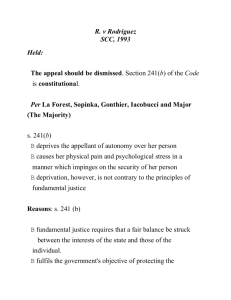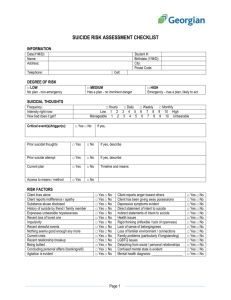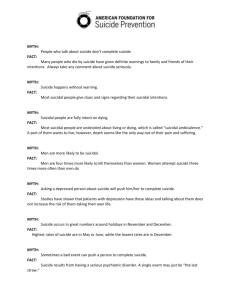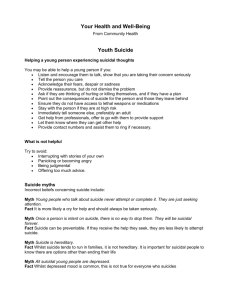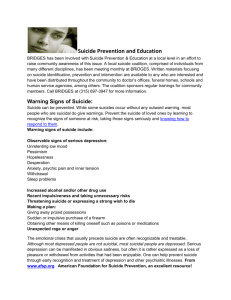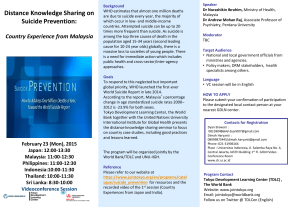Suicide Warning Signs - National Asian American Pacific Islander
advertisement
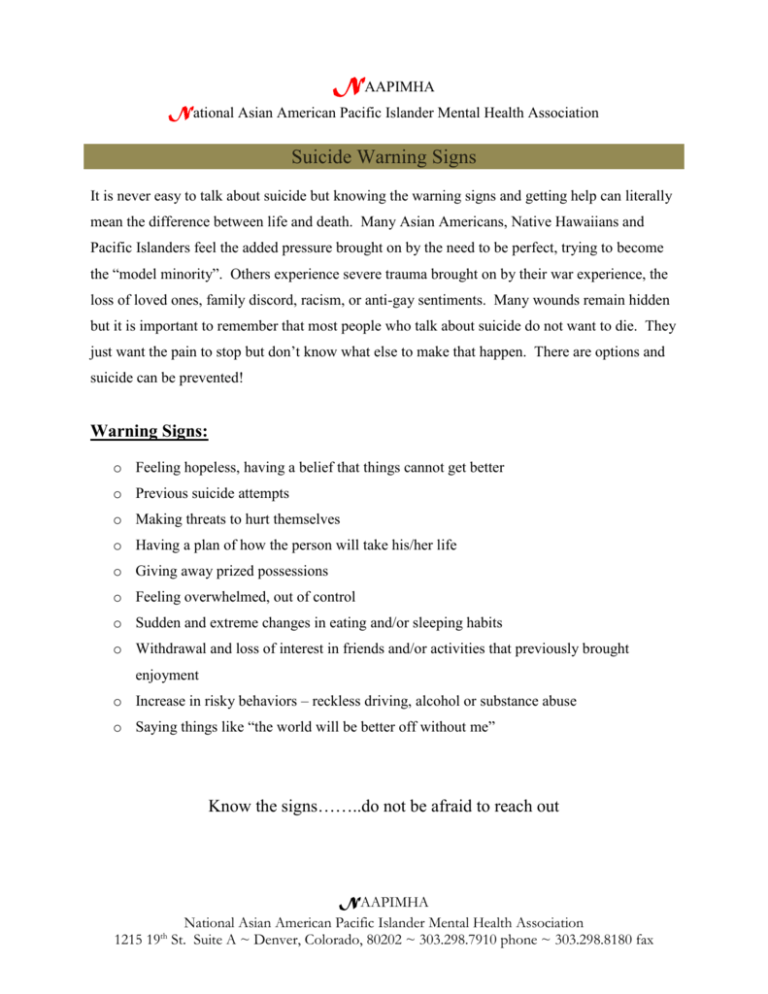
NAAPIMHA National Asian American Pacific Islander Mental Health Association Suicide Warning Signs It is never easy to talk about suicide but knowing the warning signs and getting help can literally mean the difference between life and death. Many Asian Americans, Native Hawaiians and Pacific Islanders feel the added pressure brought on by the need to be perfect, trying to become the “model minority”. Others experience severe trauma brought on by their war experience, the loss of loved ones, family discord, racism, or anti-gay sentiments. Many wounds remain hidden but it is important to remember that most people who talk about suicide do not want to die. They just want the pain to stop but don’t know what else to make that happen. There are options and suicide can be prevented! Warning Signs: o Feeling hopeless, having a belief that things cannot get better o Previous suicide attempts o Making threats to hurt themselves o Having a plan of how the person will take his/her life o Giving away prized possessions o Feeling overwhelmed, out of control o Sudden and extreme changes in eating and/or sleeping habits o Withdrawal and loss of interest in friends and/or activities that previously brought enjoyment o Increase in risky behaviors – reckless driving, alcohol or substance abuse o Saying things like “the world will be better off without me” Know the signs……..do not be afraid to reach out NAAPIMHA National Asian American Pacific Islander Mental Health Association th 1215 19 St. Suite A ~ Denver, Colorado, 80202 ~ 303.298.7910 phone ~ 303.298.8180 fax SUICIDE MYTHS AND FACTS MYTH: Suicides happen without warning. FACT: Warning signs often go unnoticed but become apparent in hindsight. MYTH: If a person is intent on suicide, there is nothing that can be done FACT: Suicides CAN be prevented with the proper support and care. MYTH: Only a trained professional can help a person who is suicidal. FACT: Professional help should be sought but friends and family members can play a critical role in a person choosing not to take their own lives. MYTH: People who threaten suicide are just seeking attention. FACT: Suicide threats should be taken seriously. For many it is a plea for help. MYTH: Talking about suicide or asking someone if they feel suicidal will encourage suicide attempts. FACT: Talking about suicide can help a person feel safe and not so alone MYTH: All people who threaten suicide want to die FACT: Most people don’t want to die, they just don’t know of a way to make the pain stop and feel that suicide is the only solution. MYTH: Someone who attempts suicide will not try it again. FACT: Many suicide victims have made attempts before. Some attempts may be hidden in the form of careless behavior such as driving recklessly MYTH: Once a suicidal crisis has passed, the person is out of danger. FACT: A critical period for suicide attempts is when a person is coming out of a depression when they have the energy to make another attempt MYTH: Most people kill themselves during winter or the Christmas holidays. FACT: Most suicide occur during the spring NAAPIMHA National Asian American Pacific Islander Mental Health Association th 1215 19 St. Suite A ~ Denver, Colorado, 80202 ~ 303.298.7910 phone ~ 303.298.8180 fax How to help someone who may be suicidal o Become familiar with the warning signs, myths and facts about suicide o Do not be judgmental or critical – this will only push the person away o Don’t lecture or tell person what to think or feel o Be supportive and listen o Be open to talking about suicide – it is ok to admit you are uncomfortable o Failure to discuss suicide makes it feel like it is something to hide or be ashamed of or is too dangerous to talk about ~ none of these encourages a person to open up o Don’t act shocked o Don’t promise to keep secrets – this is one secret that shouldn’t be kept. o Provide hope that things can get better but acknowledge it may may take time o Stay away from statements such as “you shouldn’t feel that way” of “it isn’t that bad” as this discounts their feelings and makes them feel like you really don’t understand o Better to say “I wish it didn’t hurt so much” of “I wish you didn’t feel this way” - these statements don’t tell a person how to feel but expresses your concern. o Let them know that you want to make sure they can keep themselves safe and if they can’t, you will help them find someone who can o If they are upset because you asked if they had thoughts about hurting themselves, remember that it is better to be safe than sorry. o Offer to help them seek professional help if the person is suicidal or seriously depressed. o Trying to solve the problem by yourself places both of you in a difficult and potentially dangerous situation. RESOURCES: National Suicide Hotline 1-800-273-TALK (1-800-273-8255). http://www.suicidepreventionlifeline.org/ American Association of Suicidology ~ http://www.suicidology.org/ Mental Health America ~ www.mentalhealthamerica.net National Alliance on Mental Illness ~ www.nami.org US Department of Health and Human Services – SAMHSA – Center for Mental Health Services Mentalhealth.samhsa.gov/cmhs Local mental health agencies NAAPIMHA National Asian American Pacific Islander Mental Health Association th 1215 19 St. Suite A ~ Denver, Colorado, 80202 ~ 303.298.7910 phone ~ 303.298.8180 fax


